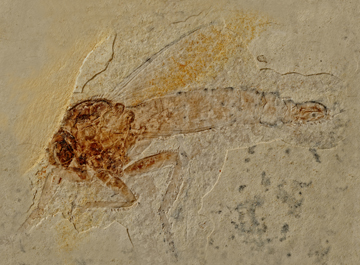Abstract
We describe herein Neoliodes andreneli sp. nov., an oribatid mite belonging to the family Neoliodidae, from the Lower Cretaceous amber of Lebanon. The new taxa is characterized, illustrated, and its systematic position is discussed. Neoliodes andreneli sp. nov. constitutes the first mite to be described from the Lebanese amber, and the earliest oribatid mite in amber.
References
Aoki, J. (2006) New and newly recorded oribatid mites (Arachnida, Acari, Oribatida) from the Ryukyu Islands, Japan. Bulletin of the National Science Museum, Tokyo. Ser. A, 32 (3), 105–124.
Arillo, A. & Subías, L.S. (2000) A new fossil oribatid mite, Archaeorchestes minguezae gen. nov., sp. nov. from the Spanish Lower Cretaceous amber. Description of a new family, Archaeorchestidae (Acariformes, Oribatida, Zetorchestoidea). Mitteilungen aus dem Geologisch-Paläontologischen Institut der Universität Hamburg, 84, 231–236.
Arillo, A. & Subías, L.S. (2002) Second fossil oribatid mite from the Spanish Lower Cretaceous amber. Eupterotegaeus bitranslamellatus n. sp. (Acari, Oribatida, Cepheidae). Acarologia, 42 (4), 403–406.
Arillo, A., Subías, L.S. & Sánchez-García, A. (2016) New species of fossil oribatid mites (Acariformes, Oribatida), from the Lower Cretaceous amber of Spain. Cretaceous Research, 63, 68–76.
https://doi.org/10.1016/j.cretres.2016.02.009
Arillo, A., Subías, L.S. & Shtanchaeva, U. (2008) A new fossil oribatid mite, Ommatocepheus nortoni sp. nov. (Acariformes, Oribatida, Cepheidae) from a new outcrop of Lower Cretaceous Álava amber (northern Spain). Systematic & Applied Acarology, 13, 252–255.
https://doi.org/10.11158/saa.13.3.13
Arillo, A., Subías, L.S. & Shtanchaeva, U. (2009) A new fossil species of oribatid mite, Ametroproctus valeriae sp. nov. (Acariformes, Oribatida, Ametroproctidae), from the Lower Cretaceous amber of San Just, Teruel Province, Spain. Cretaceous Research, 30, 322–324.
https://doi.org/10.1016/j.cretres.2008.07.013
Arillo, A., Subías, L.S. & Shtanchaeva, U. (2010) A new genus and species of oribatid mite, Cretaceobodes martinezae gen. et sp. nov. from the Lower Cretaceous amber of San Just (Teruel Province, Spain) (Acariformes, Oribatida, Otocepheidae). Paleontological Journal, 44 (3), 287–290.
https://doi.org/10.1134/S003103011003007X
Arillo, A., Subías, L.S. & Shtanchaeva, U. (2012) A new species of fossil oribatid mite (Acariformes, Oribatida, Trhypochthoniidae) from the Lower Cretaceous amber of San Just (Teruel Province, Spain). Systematic & Applied Acarology, 17 (1), 106–112.
https://doi.org/10.11158/saa.17.1.16
Azar, D., Perrichot, V., Néraudeau, D. & Nel, A. (2003) New psychodid flies from the Cretaceous ambers of Lebanon and France, with a discussion aboutt Eophlebotomus connectens Cockerell, 1920 (Diptera, Psychodidae). Annals of the American Society of America, 96, 117-127.
https://doi.org/10.1603/0013-8746(2003)096[0117:NPFTCA]2.0.CO;2
Balogh, J. & Balogh, P. (1992) The oribatid mites genera of the world. Vol. 1. Hungarian National Museum Press, Budapest, 263 pp.
Bulanova-Zachvatkina, Y.M. (1974) A new genus of mite (Acariformes, Oribatei) from the Upper Cretaceous of Taymyr. Paleontological Journal, 8, 247–250.
Ezhova, E.E. (1995) Inclusion collection of the Museum of the World Ocean (Kaliningrad). Amber & Fossils, 1, 42–46.
Granier, B., Toland, C., Gèze, R., Azar, D. & Maksoud, S. (2016) Some steps toward a new story for the Jurassic—Cretaceous transition in Mount Lebanon. Carnets de Géologie, 16 (8), 247–269.
https://doi.org/10.4267/2042/59924
Heethoff, M., Helfen, L. & Norton, R.A. (2009) Description of Neoliodes dominicus n. sp. (Acari, Oribatida) from Dominican amber, aided by synchrotron x-ray microtomography. Journal of Paleontology, 83 (1), 153–159.
https://doi.org/10.1666/08-101R1.1
Jacot, A.P. (1936) Undescribed moss mites from Mauritius. Annals and Magazine of Natural History, (10) 17, 393–403.
https://doi.org/10.1080/00222933608655134
Krivolutsky, D.A. & Ryabinin, N.A. (1976) Oribatid mites in Siberian and Far East amber. Reports of the Academy of Sciences, USSR, 230, 945–948 [In Russian].
Maksoud, S., Azar, D., Granier, B. & Gèze, R. (2017) New data on the age of the Lower Cretaceous amber outcrops of Lebanon. Palaeoworld, 26, 331–338.
https://doi.org/10.1016/j.palwor.2016.03.003
Norton, R.A., Bonamo, P.M., Grierson, J.D. & Shear, W.A. 1988. Oribatid mite fossils from a terrestrial deposit near Gilboa, New York. Journal of Paleontology, 62, 259–269.
https://doi.org/10.1017/S0022336000029905
Norton, R.A. & Poinar. G.O. (1993) Reassessment and new record of oribatid mite fossils from Tertiary Neotropical amber. Acarologia, 34, 57–68.
Sellnick, M. (1918) Die Oribatiden der Bernsteinsammlung der Universität Königsberg. Schriften der Physikalisch-ökonomischen Gesellschaft zu Königsberg, 59, 21–42.
Sellnick, M. (1931) Milben im Bernstein. Bernstein-Forschung, 2, 148–180.
Sidorchuk E.A. (2018) Mites as fossils: forever small? International Journal of Acarology, 44 (8), 349–359.
https://doi.org/10.1080/01647954.2018.1497085
Sidorchuk, E.A. & Behan-Pelletier, V.M. (2017) Megeremaeus cretaceous new species (Acari: Oribatida), the first oribatid mite from Canadian amber. The Canadian Entomologist, 149, 277–290.
https://doi.org/10.4039/tce.2017.8
Subías, L.S. (2004) Listado sistemático, sinonímico y biogeográfico de los ácaros oribátidos (Acariformes, Oribatida) del mundo (1758–2002). Graellsia, 60, 3–305. (14th update 2019)
https://doi.org/10.3989/graellsia.2004.v60.iExtra.218
Subías, L.S. & Arillo, A. (2002) Oribatid fossil mites from the Upper Devonian of South Mountain, New York and the Lower Carboniferous of County Antrim, North Ireland (Acariformes, Oribatida). Estúdios del Museo de Ciencias Naturales de Álava, 17, 93–106.
Woolley, T.A. (1971) Fossil oribatid mites in amber from Chiapas, Mexico (Acarina: Oribatei = Cryptostigmata). University of California Publications in Entomology, 63, 91–99.

